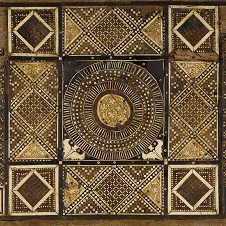Production, Transmission & Interpretation - day 3

Friday 15 March 2024, 9.00AM to 5:30 pm
Islamic time begins with the Hijra; the integral responsibilities of every Muslim include the Hajj; and studies of Islamic history have traditionally followed military marches and commercial/cultural corridors that enabled the creation of the great gunpowder empires.
More recently, mobility has also been manifested in the Islamic world in the fall of these empires, movement of their materials through loots and repatriations, and voluntary and forced migrations.
Until recently, these themes have been predominantly researched divorced from Islam through incongruous positivist lenses and euro-centric canons, and often with underlying colonial agendas. It is with the aim to intervene within and disrupt this context that the Department of History of Art and the Department of Archaeology at the University of York present Production, Transmission, & Interpretation, a conference on Islamic Art, Architecture, History, and Archaeology.
Foregrounding the voices of the historically marginalised, founded in material cultural narratives, and focussed on new sources and methodologies, this conference will bring together the latest research from scholars (doctoral to emeriti) and draw upon a range of cognate disciplines across the arts, humanities, and social sciences, to consider 1400 years of the Islamic world and society.
This event will particularly be of interest to students/academics/scholars, both from the University of York and other academic institutions.
Registration is required tickets cost £5 and are can be purchased here.
Programme - day 3
Venue: King’s Manor
09:00 – 09:30: Registration and refreshments, Huntingdon Ante Room K/123
09:30 – 11:15: Panel 5: Travels and transfers, Huntingdon Room K/122
A. Mobility, appropriation, and agency: towards an analysis of nineteenth century “shal” production and dissemination in Iran, South Asia and beyond by Dr Joanna de Groot, University of York
B. Transcultural portable art: production, transmission, utilization, and reproduction of Islamic and Chinese turquoise glazed ceramic from the 8th - 13th century by Lingyu Qin, University of Nottingham
C. Animal iconography in Almoravid textiles by Miriam Ali de Unzaga, Independent scholar, Spain
D. Travelling tents: light structures in palace gardens of Khorasan and lower Mesopotamia by Dr Safa Mahmoudian, Independent scholar
Q&A
Panel chair: Dr Mehreen Chida-Razvi
11:15 – 13:00: Panel 6: Patterns of patronage, Huntingdon Room K/122
A. No more heroes: the conquest of Tunis oil sketch by Peter Paul Rubens, c. 1635 by Dr Adam Sammut, University of York
B. Implementing imperial matronage in Mughal architecture: gendered negotiations of frameworks and networks governing construction by Parshati Dutta, University of York
C. Courtly cosmopolitanism and visual culture of the Bengal Nizamat in Murshidabad paintings from early modern Bengal by Mrinalini Sil, JNU, India
D. Geometry, art, and ideology in Fatimid, Zangid and Ayyubid Egypt and Syria by Professor Bernard O’Kane, The American University in Cairo
Q&A
Panel chair: Professor Jason Edwards
13:00 – 14:00: Lunch, Huntingdon Room K/123 14:00 – 15:45:
Panel 7: Islamic arts and ethical concerns, Huntingdon Room K/122
A. Reconstructing the past: tracing two dispersed Lajvardina tile corpora by Dr Richard Piran McClary, University of York
B. Echoes of Al-Andalus: tracing the legacy of Hispano-Moresque art in Spanish collections and the expanding canvases of the art market by Sophie Howell, Chiswick Auctions
C. Corpses as artifacts: the ethics of excavating the dead by Dr. Jochen Sokoly, Associate Professor of the Arts and Architecture of the Islamic World, VCUarts Qatar
D. The codicology of Qur’an manuscripts from China: approaches to researching an uncharted field by Marcus Fraser, Fitzwilliam Museum, University of Cambridge
Q&A
Panel chair: Professor Marcus Milwright
15:45 – 16:30: Break
16:30 – 17:30: Closing keynote, Philip Rahtz Lecture Theatre K/133
Learning from mistakes: craft practice and the interpretation of early Islamic art
by Professor Marcus Milwright
British Academy Global Professor
Professor of Islamic Art and Archaeology, Department of Art History and Visual Studies, University of Victoria, Canada
Chaired by Dr Richard Piran McClary
17:45 – 19:00: Wine Reception, Huntingdon Room K/123
Download the full 3 day Production Transmission Interpretation Programme revised (PDF ![]() , 409kb)
, 409kb)
Any questions please email Parshati Dutta and Nausheen Hoosein via islamic-art-2024-conference@york.ac.uk.
Location: Registration and Refreshments K/123 Kings Manor 9:00 am
